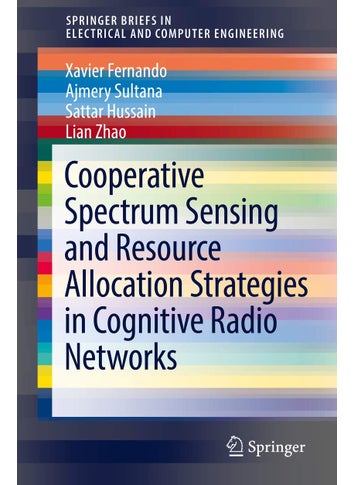| About the Author | Xavier Fernando(S’97–M’01–SM’04) received the Ph.D. degree from the University of Calgary, Calgary, AB, Canada, in 2001. In 2001, he joined Ryerson University, Toronto, ON, Canada, where he is currently a Professor and directing Ryerson Communications Laboratory. He has authored or coauthored over 150 research articles. He is also the sole author of the book “Radio over Fiber for Wireless Communications: From Fundamentals to Advanced Topics” (Wiley, 2014). He is the holder of two patents (one more pending). Prof. Fernando was a member of the IEEE COMSOC Education Board Working Group on Wireless Communications and in the TPC of many conferences including GLOBECOM (track chair) and ICC. He was an IEEE Distinguished Lecturer and has delivered invited lectures and tutorials worldwide. He is a Program Evaluator for ABET. He is the General Chair for the 2014 IEEE Canadian Conference on Electrical and Computer Engineering. He was a member of Ryerson Board of Governors during 2010–2011 and the Chair of the IEEE Toronto Section during 2012–2013. His works (with students) have won several awards and prizes, including First Prize in the IEEE Humanitarian Initiative Technology Workshop in 2014, IEEE Microwave Theory and Techniques Society Prize in 2010, Sarnoff Symposium Prize in 2009, Opto-Canada Best Poster Prize in 2003 and, CCECE Best Paper Prize in 2001. He was a finalist for the Top 25 Immigrant Award of Canada in 2012.Ajmery Sultana received her B.Sc. and M.Sc. degrees in applied physics, electronics and communication engineering from the University of Dhaka, Dhaka, Bangladesh, in 2006 and 2008, respectively. She is currently pursuing the PhD degree in electrical and computer engineering at Ryerson University, Canada. She is also an Assistant Professor (on leave) with University of Information Technology & Sciences (UITS), Dhaka, Bangladesh. Her current research interests include resource allocation in cognitive and cooperative communication systems, and device-to-device communication.Sattar Hussain received his Ph.D. degree from the Department of Electrical and Computer Engineering, Ryerson University, Toronto, Canada, in 2013. He joined the Department of Information and Communications Engineering Technology (ICET), Centennial College, Toronto, Canada in 2016 as a Faculty Member. Since 2009, he is teaching as adjunct Faculty at the Department of Electrical and Computer Engineering, Ryerson University, Toronto, Canada. From 2005 to 2007, he joined the Cable shoppe Inc., Toronto, Canada as a Senior R&D Engineer. His current research spans the broad area of wireless communications. Recently, he is focusing in cooperative spectrum sensing, cognitive radio networks, Ad Hoc and Mesh Network, IoT Applications, Mobility in Wireless Networks, and adaptive signal processing. He participated as a committee member in organizing INCF2009, CCECE2014, IHTC2017 conferences. Currently he is a guest editor for International Journal of Distributed Sensor Networks "Special Collection on Knowledge and Development of IoT and Cyber-Physical Systems Architectures”. He won the 3rd best paper award in IHTC2017 for a research in wireless body area networks.Lian Zhao (S’99–M’03–SM’06) received the Ph.D. degree from the Department of Electrical and Computer Engineering (ELCE), University of Waterloo, Canada, in 2002. She joined the Department of ELCE at Ryerson University, Toronto, Canada, in 2003 and a Professor in 2014. Her research interests are in the areas of wireless communications, radio resource management, power control, cognitive radio and cooperative communications, optimization for advanced wireless communication systems. |
Free & Easy Returns
Best Deals




